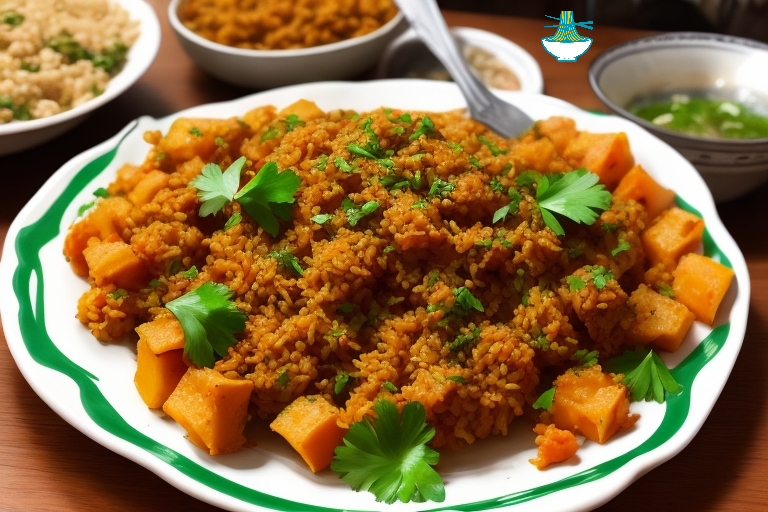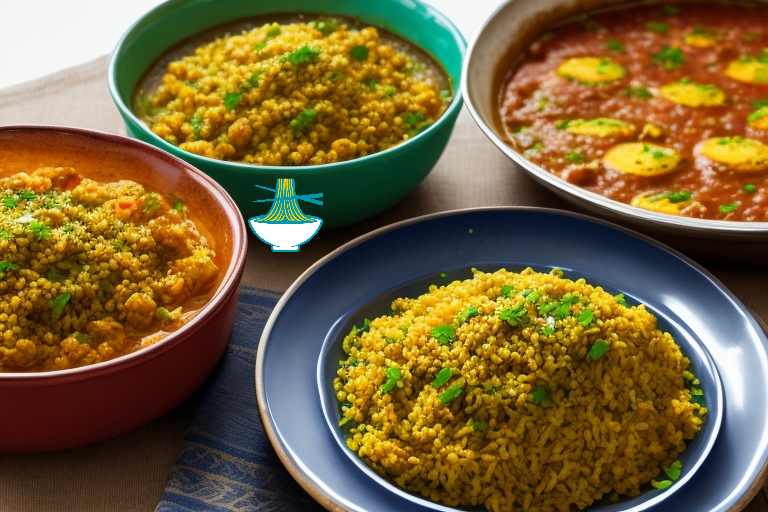Step into the vibrant world of Algerian cuisine with Rfissa, also known as Trid Rfissa. This traditional Algerian dish combines layers of thin, flaky pastry with flavorful chicken and a unique fenugreek sauce. Often prepared for special occasions, Rfissa represents a celebration of tradition and togetherness, offering a glimpse into the heart of Algerian cooking.

Rfissa is nutritionally beneficial, providing protein from the chicken and digestive aid from fenugreek seeds. Its historical roots reflect Algeria's diverse cultural influences, blending Arab, Berber, and French culinary traditions. Preparing Rfissa involves marinating chicken with spices, cooking it to tender perfection, and layering it with msemen or warqa pastry sheets brushed with olive oil. The distinctive fenugreek sauce adds a unique aroma and flavor.
Traditionally enjoyed by hand, Rfissa enhances the communal dining experience. Whether you're seeking a new culinary adventure or wishing to connect with Algerian heritage, Rfissa offers an unforgettable gastronomic journey. This savory, aromatic dish embodies the rich traditions of North African cuisine, making it a perfect addition to any celebratory meal.

Ingredients:
For the Chicken and Marinade:
- 1 whole chicken, cut into pieces
- 1 large onion, finely chopped
- 3 cloves of garlic, minced
- 1 teaspoon ground ginger
- 1 teaspoon ground cinnamon
- 1 teaspoon ground cumin
- 1 teaspoon paprika
- Salt and black pepper to taste
- 3 tablespoons olive oil
- 1/2 cup water
For the Fenugreek Sauce (Msemen):
- 1 cup fenugreek seeds (hshouma), soaked and washed
- 1/2 cup olive oil
- 1 teaspoon ground paprika
- 1 teaspoon ground cumin
- Salt to taste
For the Trid (Layered Thin Pastry):
- Thin sheets of msemen or warqa (available in Middle Eastern stores)
- Olive oil for brushing
Instructions:
Marinate the Chicken:
- In a large bowl, combine the chicken pieces with the chopped onion, minced garlic, ground ginger, ground cinnamon, ground cumin, paprika, salt, and black pepper.
- Mix well, ensuring the chicken is evenly coated with the spices and aromatics.
Cook the Chicken:
- In a large, deep skillet or a tagine, heat 3 tablespoons of olive oil over medium heat.
- Add the marinated chicken and sear it until it's browned on all sides.
- Pour in 1/2 cup of water, cover, and simmer on low heat for about 45 minutes or until the chicken is tender and fully cooked. If needed, add more water during cooking to maintain a flavorful sauce.
Prepare the Fenugreek Sauce (Msemen):
- While the chicken is cooking, prepare the fenugreek sauce. In a separate skillet, heat 1/2 cup of olive oil over medium heat.
- Add the soaked and washed fenugreek seeds and stir continuously until they turn dark brown and release their aroma. Be careful not to burn them.
- Remove from heat and add the paprika, cumin, and a pinch of salt. Mix well and set aside.
Layer the Trid (Thin Pastry):
- Place a thin sheet of msemen or warqa on a large serving platter.
- Brush it lightly with olive oil, then add another sheet on top.
- Continue layering and brushing with olive oil until you have a stack of pastry sheets.
Assemble the Rfissa:
- To serve, break the msemen or warqa into smaller pieces and place them on the serving platter.
- Pour the fenugreek sauce (Msemen) over the layers of pastry.
- Top with the cooked chicken and its aromatic sauce.
Serving:
- Traditionally, Rfissa is eaten by hand, and it's common to use pieces of msemen to scoop up the chicken and fenugreek sauce.
- Enjoy your flavorful Algerian Rfissa with family and friends during special occasions!
Algerian Rfissa is a unique and delicious dish that combines the aromatic flavors of fenugreek with tender chicken and delicate layers of msemen or warqa pastry. It's a true delight for those seeking an authentic taste of Algeria.
Nutritional Values
Nutritional values for the ingredients in the Algerian Rfissa recipe can vary depending on factors such as portion sizes, brand of ingredients, and specific preparation methods. Below are approximate nutritional values for the main ingredients used in the recipe. Keep in mind that these values are estimates and can change based on the specific brands and quantities you use:
For the Chicken (per 3.5 ounces or 100 grams, cooked):
- Calories: 165 kcal
- Protein: 31 g
- Fat: 4 g
- Carbohydrates: 0 g
- Fiber: 0 g
- Sugars: 0 g
benefits: Provides protein and essential nutrients like iron and zinc.
For Olive Oil (per tablespoon):
- Calories: 120 kcal
- Fat: 14 g
- Carbohydrates: 0 g
- Protein: 0 g
benefits: Adds richness to the marinade and helps coat the chicken for even cooking.
For Fenugreek Seeds (per tablespoon, dried):
- Calories: 35 kcal
- Protein: 2 g
- Fat: 1 g
- Carbohydrates: 6 g
- Fiber: 3 g
- Sugars: 0 g
benefits: Rich in fiber and antioxidants, fenugreek seeds are believed to have various health benefits, including aiding digestion and potentially lowering blood sugar levels.
For Ground Spices (per teaspoon, ground):
- Calories: Varies by spice but is generally very low, around 5-10 kcal.
- The primary contribution of ground spices is flavor rather than significant caloric content.
benefits:
- Ground paprika: Adds a mild, sweet, and smoky flavor to the sauce.
- Ground cumin: Enhances the flavor profile with earthy and aromatic notes.
- Salt: Enhances taste and seasoning.
For Msemen or Warqa (per sheet):
- Calories: Varies depending on the thickness and size of the pastry sheet, but a typical sheet may have around 70-100 kcal.
- Carbohydrates: Varies but is primarily from starch.
The nutritional values provided here are rough estimates and can change based on the actual quantities and specific brands of ingredients you use. For more accurate nutritional information, you may want to use a nutrition calculator or consult the nutritional information on the packaging of the specific ingredients you choose. Additionally, keep in mind that the dish's final nutritional content will depend on the portion size and the number of servings you consume.

Comments